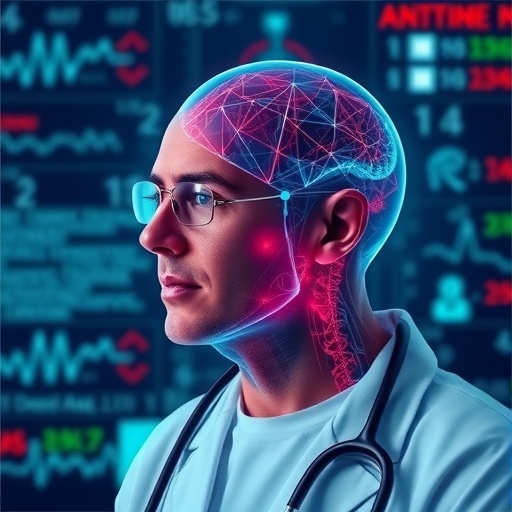Researchers at the University of California, San Francisco (UCSF) are exploring the potential of artificial intelligence (AI) to enhance the diagnostic process for hepatorenal syndrome (HRS), a complicated condition often linked to liver disease. This innovative study, which has recently been published in the journal Gastro Hep Advances, highlights the application of AI in deciphering clinical notes from various healthcare providers to yield improved diagnostic accuracy.
Hepatorenal syndrome is a serious and often underdiagnosed condition characterized by renal failure associated with liver cirrhosis. Diagnosing HRS can be a challenge during hospitalizations, particularly when the clinical presentation is ambiguous, and symptoms can easily be misattributed to other complications arising from liver impairment. Traditional diagnostic methods primarily rely on clinical variables and laboratory results, but the multifaceted nature of HRS occasionally leads to conflicting opinions among healthcare professionals. This variability in diagnosis emphasizes the need for integrated approaches that could streamline decision-making.
The UCSF study, spearheaded by Dr. Jin Ge, an assistant professor of medicine and gastroenterologist, seeks to address this diagnostic dilemma. By employing a method akin to sentiment analysis—commonly utilized in processing online reviews—this research aims to ascertain whether the collective opinions derived from multiple clinical notes can predict HRS more accurately than existing methods. In this context, sentiment analysis acts as a tool to aggregate and summarize the various opinions and observations made by different healthcare providers involved in a patient’s care.
In their pursuit, the researchers conducted a comparative analysis between the conventional diagnostic practices and an AI-enhanced model that integrates sentiment analysis scores extracted from clinical narratives. The findings were striking. Incorporating AI-generated sentiment scores markedly improved the predictive accuracy of HRS diagnoses upon patient discharge. This significant enhancement suggests that AI can play a crucial role not only in diagnosing complex conditions but also in expediting patient care by ensuring timely treatment decisions.
Furthermore, the AI technology doesn’t merely focus on predictive outcomes; it also seeks to unify varying clinical viewpoints into a coherent summary. This cohesive representation of the care team’s collective sentiment can prove invaluable, particularly in instances where conflicting recommendations arise among practitioners. By providing clarity in such scenarios, AI-generated summaries hold the potential to mitigate confusion, thus aiding healthcare professionals and patients alike in understanding the consensus on a patient’s condition.
While the implementation of this AI-driven approach within clinical settings remains a future endeavor, it lays a promising foundation for advancing diagnostic practices in hospitals. The researchers acknowledge the necessity of evaluating how these AI tools could impact real-world decision-making and patient care, suggesting the potential for upcoming trials that could pave the way for broader adoption.
Importantly, the study underscores the concept of leveraging the ‘wisdom of the crowd.’ It posits that when healthcare teams are faced with uncertainty or diverse opinions, the insights generated through AI can provide directional guidance. This advanced decision-support tool may not only enhance the accuracy of diagnoses but also foster a more aligned approach to managing complex cases.
The implications of these findings extend beyond the clinical realm. As healthcare systems increasingly confront the challenges of accurate diagnosis amid multidimensional patient presentations, the integration of AI could revolutionize current practices. It could potentially transform how healthcare providers interact with one another and how they come to consensus on care pathways, thereby leading to optimized patient outcomes.
Looking ahead, the UCSF team is keen to expand upon this research, conducting further studies that explore the practical application of AI in routine clinical practice. Such future inquiries could illuminate the pathways through which AI-guided recommendations influence treatment plans and ultimately improve patient experiences. The promise of integrating AI into healthcare is not merely theoretical; it stands at the forefront of a paradigm shift that could lead to significant advancements in how complex conditions like HRS are diagnosed and managed.
The research was funded by esteemed institutions including the National Institute of Diabetes and Digestive and Kidney Diseases and the National Center for Advancing Translational Sciences. With protocol adherence and ethical considerations in mind, the study was structured to ensure rigorous methodologies and transparency throughout.
In conclusion, the exploration of AI in diagnosing hepatorenal syndrome represents a critical step forward in the field of clinical medicine. By harnessing data-driven insights from collective clinical notes, researchers at UCSF are on the cutting edge of potentially transforming diagnostic processes. As they look to the future, the integration of AI in healthcare promises a new horizon in patient care—one characterized by improved accuracy, efficiency, and an enhanced ability to navigate complexity in clinical decision-making.
Subject of Research: Artificial Intelligence in Diagnosing Hepatorenal Syndrome
Article Title: AI-Enhanced Diagnostic Accuracy for Hepatorenal Syndrome Using Clinical Notes
News Publication Date: October 2023
Web References: [Not available]
References: [Not available]
Image Credits: [Not available]
Keywords: Artificial Intelligence, Hepatorenal Syndrome, Clinical Diagnosis, UCSF, Medical Technology, Health Care Innovation, Sentiment Analysis, Decision-Making, Patient Care.
Tags: AI applications in complex medical casesAI in medical diagnosticsartificial intelligence in gastroenterologyclinical notes analysis for HRSenhancing healthcare insights through technologyhepatorenal syndrome diagnosis challengesimproving diagnostic accuracy with AIintegrated approaches to medical diagnosisleveraging AI for clinical decision-makingsentiment analysis in healthcareUCSF research on liver diseaseunderdiagnosed liver-related conditions





